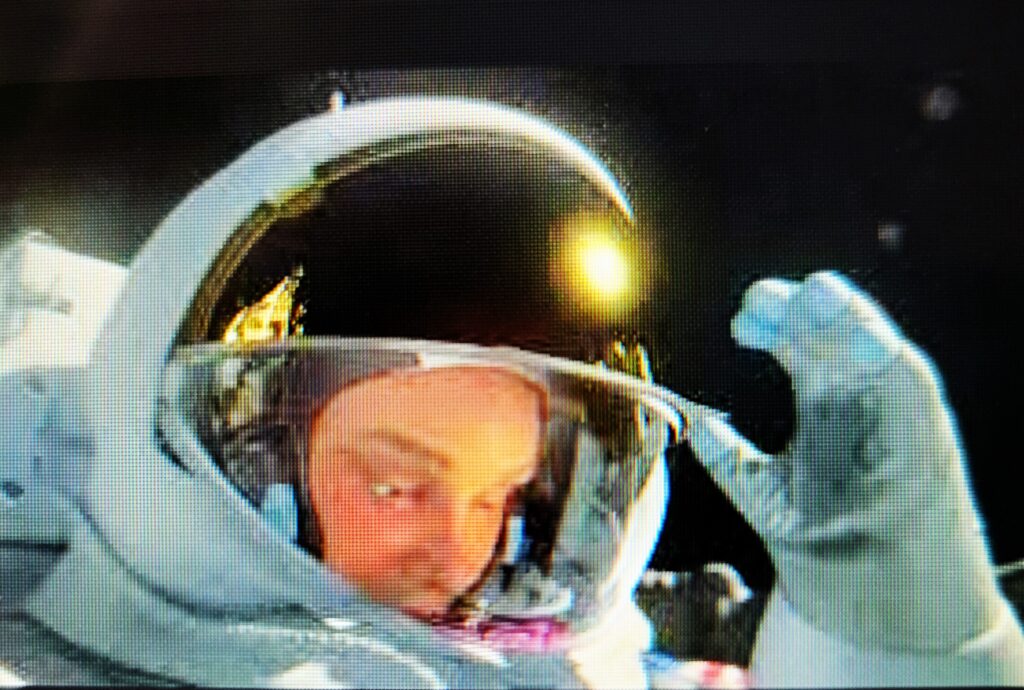
(For the audio version of this blog, please visit: https://brothersinchristcmf.org/wp-content/uploads/2024/09/Mass-Blog-for-the-25th-Sunday-of-Ordinary-Time-2024-1.mp3)
A recent movie, “Fly Me to the Moon,” was marketed as a tale about people intent on faking the Apollo 11 moon landing. This secret mission was to offer insurance against the possibility of the REAL mission failing, and ceding U.S. space exploration leadership to the Soviets. The movie is full of surprises, but the biggest one was revealed in a little scene where NASA’s chief marketer and the mission’s lead scientist try prying additional funding for the real mission out of a skeptical Senator—who happens to be a Christian.
The scene opens with a close-up of a painting of Christ on this Senator’s wall. What threatened to turn into another anti-Christian Hollywood mockery of our faith turns out to be this movie’s salvation in the hearts of its audience’s God-believers.
The lead scientist reassures this Christian politician that an unspoken accomplishment of the Apollo missions has always been the reinforcement of faith among many of its astronauts. This finally convinces the Senator it’s a mission worth funding.
Though “Fly Me to the Moon” is fiction, this little scene tells a truth about our greatest heroes, whether they’re explorers of outer or inner space: their realization that mission must eclipse ego.
On the 50th anniversary of the Apollo 11 moon landing, a Catholic Newspaper, “The Pilot,” published an article noting that Buzz Aldrin, the second man to walk the moon’s surface, read Psalm 8:4-5 to the audience tracking his return the night before splashdown:
When I see your heavens, the work of your fingers, the moon and stars that you set in place—what is man that you are mindful of him,and a son of man that you care for him?
Aldrin was allowed to take communion while in space. Before receiving it one night, Aldrin read another piece of scripture indicating his belief that as man probes space, he is acting in Christ.
“I sensed especially strongly my unity with our church back home, and with the church everywhere,” this article quotes him. “I read: ‘I am the vine, you are the branches. Whoever remains in me, and I in him, will bear much fruit; for you can do nothing without me.'” (Jn 15:5)
That brings us to this Sunday’s liturgy, whose readings both warn us against the kind of selfish motives depicted in the movie and remind us of our true mission on earth. The first reading from Wisdom 2 gives us an example of human ego wounded by a lack of faith. The section of Wisdom immediately preceding Sunday’s excerpt states:
“For by mere chance were we born, and hereafter we shall be as though we had not been; Because the breath in our nostrils is smoke, and reason a spark from the beating of our hearts. And when this is quenched, our body will be ashes and our spirit will be poured abroad like empty air. Even our name will be forgotten in time, and no one will recall our deeds.”
The second reading from James probes our egotistical hearts further:
Is it not from your passions that make war within your members? You covet but do not possess. You kill and envy but you cannot obtain; you fight and wage war. You do not possess because you do not ask. You ask but do not receive, because you ask wrongly, to spend it on your passions. (Jas 3:16—4:3)
The lead scientist in “Fly Me to the Moon” wins funding for his mission because he asks rightly, indicating a mission bigger than the ego of astronauts and of those seeking dominance over enemies. While exploring the infinity surrounding humanity, all explorers of faith should absorb the lesson Christ shamed his disciples into learning after they finished arguing with each other about who was the greatest among them.
“If anyone wishes to be first, he shall be the last of all and the servant of all,” Jesus teaches them and us in Sunday’s gospel reading (Mk 9:30-37).
And indeed, one of the most important lessons of space exploration is how many disparate little contributions must come together to assemble the rocket that launches us to our goal. As many of these explorers learned, their true goal was to see the face of God. For all of humanity to accomplish that mission, we desperately need each other.
–Tom Andel
There are countless examples of prominent people who do extraordinary things, at least as the world values such.
The real heroes in the eyes of God are the simple servants who do the will of God in not so extraordinary ways. From Mother Theresa, to the cloistered Nun or Monk who spend their time seeking the Lord’s will for others in prayer.
In the Father’s house there are many dwelling places. These quiet, unknowns to the world will probably get the best rooms!
You’re right, Thomas, the more we look toward outer space for miracles, the fewer we notice in our inner spaces.
It is a paradox that each believer’s mission to do God’s Will is as meaningful as the Apollo Mission.
More meaningful! Our God is King of the Universe, after all.
Tom,
Once again you speak of worldly concerns while applying the weeks reading and we suddenly understand the word. Jesus Christ our Lord came into the world he created for us as a helpless baby and although he healed us, removed evil spirits from our souls we crucified Him. He had no ego, He was pure love and we could not tolerate His humble spirit. We tried to put Him last but He remains first, powerful enough to be seen and proclaimed in outer space. Loved your article.
Jesus was and is many things to humanity, Deb. Pure love combined with unvarnished truth. Truth can hurt. Our role, to paraphrase that famous Jack Nicholson line from “A Few Good Men,” is to help each other “handle the truth.”